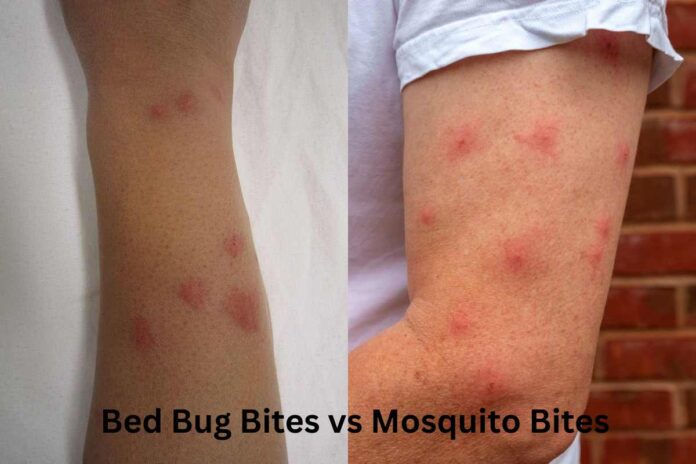
Bed bugs and mosquitoes are two of the most common insects that can cause pesky skin bites. Both can be a nuisance and cause discomfort, but it’s important to identify the culprit behind the bites in order to take the appropriate measures to eliminate them from your environment.
Bed Bugs: The Stealthy Bloodsuckers
Bed bugs are small, brownish insects that feed on the blood of humans and animals. They are nocturnal creatures, which means they are most active at night and prefer to feed on their host while they are sleeping. Bed bugs are generally found in and around the bed area, hence the name, but they can also be found in other areas of the home such as upholstered furniture, and cracks and crevices in walls and floors.
Identifying bed bug bites can be a bit tricky as they can resemble other insect bites or skin conditions. However, bed bug bites are usually grouped together in a small area and are often accompanied by redness, swelling, and intense itching. Some people may not have any reaction to bed bug bites, while others may experience severe allergic reactions.
If you suspect you have a bed bug infestation, it’s important to inspect the mattress, box spring, and bed frame for signs of bed bugs such as live bugs, shed skins, and fecal stains. It’s also important to thoroughly inspect other areas of the home for signs of bed bugs and to take the appropriate measures to eliminate them from your environment.
Mosquitoes: The Tiny Menace
Mosquitoes are small flying insects that feed on the blood of humans and animals. They are most active during dusk and dawn, but some species of mosquitoes are active during the day as well. They are often found in areas with standing water such as ponds, lakes, and swamps, but they can also breed in artificial containers such as buckets, flower pots, and birdbaths.
Identifying mosquito bites is usually quite easy as they are characterized by raised, red, itchy bumps that can appear anywhere on the body. Mosquito bites can be quite irritating and can lead to swelling and discomfort, but they are usually harmless and resolve on their own within a few days.
While mosquitoes are generally more of a nuisance than a threat, they can transmit diseases such as malaria, dengue fever, and Zika virus. It’s important to take measures to protect yourself from mosquito bites, especially if you live in an area where mosquito-borne diseases are prevalent.
Preventing and Treating Insect Bites
Regardless of whether the culprit behind your pesky skin bites is a bed bug or a mosquito, there are a number of measures you can take to prevent and treat insect bites:
– Use insect repellent: Applying insect repellent containing DEET, picaridin, or oil of lemon eucalyptus can help protect you from mosquito bites.
– Wear protective clothing: Wearing long sleeves, pants, and socks can help prevent insect bites, especially if you are spending time in wooded or grassy areas where ticks and mosquitoes are prevalent.
– Avoid areas with infestations: If you suspect an area is infested with bed bugs or mosquitoes, it’s best to avoid it until the infestation has been resolved.
– Use bed bug mattress encasements: Encasing your mattress and box spring in a bed bug-proof cover can help prevent bed bug infestations and make it easier to detect and eliminate any existing infestations.
– Use over-the-counter treatments: Over-the-counter antihistamines, corticosteroid creams, and calamine lotion can help reduce itching and swelling associated with insect bites.
– Seek professional help: If you suspect you have a bed bug or mosquito infestation, it’s important to seek professional help to properly identify and eliminate the pests from your environment.
In conclusion, identifying the culprit behind pesky skin bites is important in order to take the appropriate measures to prevent and treat them. Whether it’s bed bugs or mosquitoes, there are a number of steps you can take to protect yourself from insect bites and to eliminate infestations from your environment. By being proactive and vigilant, you can reduce the risk of insect bites and enjoy a bite-free environment.

















